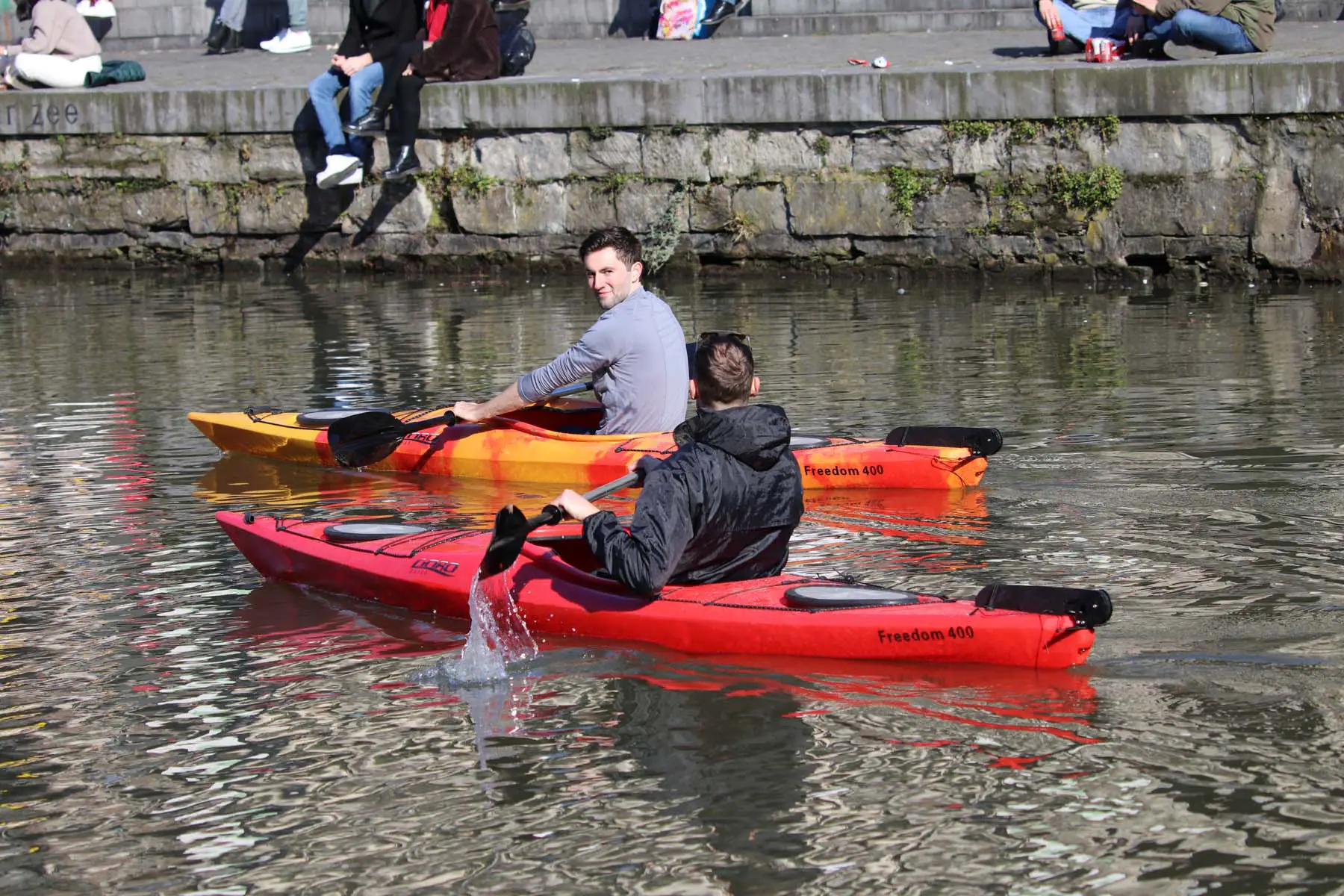Whether you’re heading for the cosmopolitan streets of chic Antwerp or a picturesque village in the stunning Ardennes region, Belgium certainly packs a punch for new arrivals. But wherever you’re moving to in this compact little country, the best thing is that you can now, finally, call Belgium home.
However, those first few days in any new country can be a rollercoaster for even the most seasoned expats. After all, knowing how to navigate everyday life in a brand new place can be challenging, whether it’s knowing where to buy Belgian groceries or which tram takes you home. To help you start your new life on the right foot, here are 10 things to do during your first week in Belgium.
ING
Trust ING for your banking in Belgium. One of the country’s big 4 banks, they provide a wide range of services, including bank accounts, savings, loans, investments, insurance, and more. With tools to compare and calculate your options, they help you make the right financial decisions. Visit ING online and let your money go further.
1. Find your new Belgian home
OK, so once you’ve stepped foot on Belgian soil, the first thing you’ll need to do is find somewhere you can call home. Some international arrivals may have accommodation sorted ahead of time by their employers, whether temporary or a more permanent solution. However, the majority of expats will need to find their own shelter when they enter the country. Fortunately, there are plenty of options in Belgium. For a short-term fix, serviced apartments or holiday rentals such as Airbnb can be a good option if you need something to tide you over for those first few weeks.

Looking for something a little more permanent for you and your family? Then you might want to think about renting a property in Belgium, which is where many new international arrivals find their next home. Rental prices fluctuate significantly throughout the country, and you can typically expect to pay more in Flanders than you would in Wallonia, especially in larger cities. If you’re thinking about buying a property in Belgium, your best bet is to get the help of a local real estate agent. However, before all that, do some research on an online property portal. This will give you a good idea of the local market before you start your search.
2. Register with the Belgian authorities
Like many of its European neighbors, Belgium requires all foreigners to register with their local municipality if they plan to stay for longer than three months. This includes citizens of other EU/EEA member states and Switzerland, who don’t need a visa to live in Belgium. You must report to the local municipality (maison communale/gemeentehuis) within eight days of arriving in Belgium. This process places you on the country’s Foreigner Register and ensures you are provided with a Belgian residency permit and multi-purpose national ID number.

The registration procedure is relatively similar across Belgium, although be aware that some municipalities are more used to dealing with foreigners than others. The process will depend on where you’re moving from, but you’ll typically need to provide valid ID, proof of housing and employment contracts, and any visa documents you’ve been issued with. Be aware that around two weeks after you register, police officers will visit the address you give to ensure you’re living there. For any subsequent moves, you’ll need to provide the required information to the local municipality.
3. Sign up for health insurance
Foreigners planning to live in Belgium for longer than a few months need to sign up for health insurance upon entering the country. Typically, this means registering with Belgium’s health insurance scheme or providing evidence of a private health cover. Many expats alike choose to top-up their Belgian state health insurance with additional private cover. Some of the leading health insurance providers in Belgium include:
If you’re an EU/EEA citizen and only planning a short-term stay in Belgium, you can use your European Health Insurance Card (EHIC).

As well as health insurance, there are several other types of insurance you’ll probably want to consider during your first week in Belgium. For example, you’ll need car insurance if you’re planning to drive in Belgium. You’ll also need home coverage for your new home, whether building insurance or home contents cover. You’ll soon discover there are plenty of insurance products available in Belgium. For more information on what you’ll need, read our guide to insurance in Belgium.
4. Open a Belgian bank account
Take your new life to the next level by opening a Belgian bank account during your first week in Belgium. Getting a local bank account will make life a lot easier, especially when it comes to setting up home utilities or internet and TV. It’ll also help if you’re exploring your new home, whether it’s at the local Belgian supermarket or treating the family to some waffles.

Despite its relatively compact size, Belgium has a decent number of banking options for new arrivals. The biggest national and international banks in Belgium include:
The quickest way to open an account is to simply visit a store in person, although you may need to brush up on your Dutch or French skills beforehand. Another option is opening a Belgian mobile banking account with a provider such as N26. These often offer easier sign-up processes for expats.
If you need to transfer money from your old accounts, then money transfer platforms such as CurrencyFair and Wise can also help.
5. Get a Belgian SIM card
Want to keep in touch with family back home and new friends in Belgium? Or maybe you’ve decided to take the plunge and set up your own business in Belgium? Whatever your reason, getting a Belgian SIM card can make a world of difference to your new life. This is particularly true if you’re arriving from a non-EU country and you don’t enjoy free roaming. Put simply, there are two main ways to get a Belgian SIM card and a local phone number: a prepaid SIM and a mobile contract. However, you’ll need to choose the right option for your usage.

When you arrive in Belgium, you’ll soon find plenty of choice when it comes to choosing a local mobile operator. However, while all this choice can seem overwhelming at first, it won’t take you long to get to grips with the local mobile market. Some of the leading mobile operators in Belgium include:
Whichever network you choose, be sure to download these top 10 must-have Belgian apps during your first week in Belgium.
6. Find a job
Unless you already have a job secured before you arrive in the country, finding a job in Belgium will likely be high on your to-do list for your first week. The job market can fluctuate heavily between regions, which is something you may want to consider when deciding where to live in Belgium. Generally speaking, the highest number of English-speaking jobs can be found in Brussels. The capital has a large international community and the highest concentration of job opportunities for expats.

Wherever you are in the country, it’s best to start the job hunting process during your first week in Belgium. For example, it’s always a good idea to tailor your resume to the Belgium job market. You might even want to contact a few local job agencies that operate in your sector. Online job boards can also be a good place to start your search, such as our own Expatica jobs portal. For more information, make sure you read our guide to finding a job in Belgium.
7. Sort out your transport
Unless you plan on lying low for a few days, you’ll soon need to start thinking about your transport options during your first week in Belgium. Thankfully, this compact little country has plenty of options. Firstly, in large towns and cities, you’ll be able to get around easily using Belgian public transport, such as bus, metro, and tram. Some cities also have good (and improving) cycle networks, making it easy to get around on two wheels even if you’re not used to it. Bike hire schemes can be found in some cities to help deal with growing demand.

However, some new arrivals in Belgium will need four wheels to get around the country. This is especially true in some rural areas with fewer transit links. New arrivals from EU/EEA countries will be able to use their existing licenses in Belgium, however, if you’re planning to stay a while you should swap it for a local license once you’ve received your ID card. For more information, read our guide to getting a Belgian driving license.
8. Get your new home connected
If you’ve found your dream house in Belgium, you’ll need to sort out all the necessary connections to turn it into your new home. Included on your list should be getting set up with Belgian utilities and home telecoms. Typically, serviced apartments and some rental properties will already have these contracts set up. This is also the case for flatshare rentals, with costs then split between housemates. However, most rental properties will need these connections set up, as well any Belgian properties you plan on buying.

Although this sounds like a lot of hard work to do during your first week in Belgium, don’t let yourself get overwhelmed. The sign-up procedures for Belgian internet and TV are fairly straightforward, even for non-native speakers, and there are comparison services that can help you choose. Some of the leading TV and internet providers in Belgium include:
In Belgium, water is supplied locally so you’re unable to choose a provider. However, you are able to choose your Belgian electricity and gas supplier, with providers including:
To find out how you can make more environmentally-friendly choices in your new home, read our guide to living sustainably in Belgium.
9. Enrol the kids in school
Relocating to a new country with school-age children can add another dimension of uncertainty to the challenge of moving to Belgium. However, you can help make things a lot easier for yourself by researching the Belgian education system ahead of time. If you’ve decided to enroll your child(ren) at a local public school, be sure to contact your local municipality during your first week in Belgium. This is typically the cheapest and easiest option for most expats, as well as being a great way to integrate your little ones into the local culture.

However, many international arrivals will prefer to enroll their little ones at one of the many international schools in Belgium. This is often a better option if you’re looking for global programs, such as International GCSEs and the International Baccalaureate. If your kids aren’t quite old enough for school, you’ll probably need to start looking at childcare options during your first week in Belgium. You’ll find plenty of international daycare centers in and around Brussels due to the large expat community. However, places can fill up quickly. If you want to brush you on your Dutch or French, you’ll probably want to check out the local language schools.
10. Explore Belgium
You only have one first week in Belgium, so make it count! While the rest of this list might sound like hard work, don’t forget to put yourself out there and soak up all that excitement of living abroad. After all, for a relatively small country, Belgium definitely packs a lot into its borders and has plenty of great places to visit. Be sure to give yourself a well-earned break from comparing energy prices and get out there and explore your new home.

Wherever you settle in Belgium, there are plenty of fun ways to spend your free time. From taking a cycle through the beautiful Ardennes region to visiting one of its many famous spas to enjoying a lazy day on the beach at Oostende. Then there are the charming medieval cities of Bruges or Ghent, which are perfect for walking around, or even kayaking. But if that sounds a little too much, then why not simply wander around your new neighborhood? This will give you a good idea of the best places to grab a coffee or beer, some famous Belgian frites, or even a tasty waffle. Enjoy!




